1971年、ベトナム戦争の解決のためキッシンジャーが周恩来と会談、これがきっかけで、米国はこれまでの台湾寄りから大きく方針転換して中国の「台湾は中国の一部」という主張を認め、米中の国交回復につながった、という記事が昨日2月28日付のニューヨーク・タイムスに掲載され、これが『キッシンジャー回顧録』と矛盾する、台湾を駆け引きの材料として使ったなど、今日の各紙の後追い報道でも波紋を呼んでいます。
<元記事>
Records Dispute Kissinger on His '71 Visit to China
(New York Times 2002.02.28)
http://www.nytimes.com/2002/02/28/international/asia/28CHIN.html
<今日の各紙>
■South China Morning Post
Documents show Kissinger struck Taiwan deal
■聯合報
《季辛吉、周恩來會談1》一九七一年 季辛吉密訪大陸
http://udnnews.com/NEWS/FOCUSNEWS/HOT-TOPIC/720729.shtml
《季辛吉、周恩來會談2》季、周密談 為尼克森到訪舖路
http://udnnews.com/NEWS/FOCUSNEWS/HOT-TOPIC/720732.shtml
《季辛吉、周恩來會談3》韓戰結束後 美宣布台灣地位未定
http://udnnews.com/NEWS/FOCUSNEWS/HOT-TOPIC/720730.shtml
《季辛吉、周恩來會談4》越戰後 美打算從台灣撤走2/3兵力
http://udnnews.com/NEWS/FOCUSNEWS/HOT-TOPIC/720733.shtml
《季辛吉、周恩來會談5》季辛吉曾保證 美不支持台獨
http://udnnews.com/NEWS/FOCUSNEWS/HOT-TOPIC/720731.shtml
■自由時報
30年前 季辛吉即承諾美不支持台灣
http://www.libertytimes.com.tw/2002/new/mar/1/today-p2.htm
■Taipei Times
Kissinger used Taiwan to help end Vietnam war
http://www.taipeitimes.com/news/2002/03/01/story/0000125856
---
尚、これと別に「ニクソンはベトナムに核使用を考えていた」というニュースが(も)日本などでも割と大きく扱われています。これに出てくる「文書」と情報源は同じだろうか?何れもまだ詳しく見てませんが。
<元記事>
Records Dispute Kissinger on His '71 Visit to China
(New York Times 2002.02.28)
http://www.nytimes.com/2002/02/28/international/asia/28CHIN.html
<今日の各紙>
■South China Morning Post
Documents show Kissinger struck Taiwan deal
■聯合報
《季辛吉、周恩來會談1》一九七一年 季辛吉密訪大陸
http://udnnews.com/NEWS/FOCUSNEWS/HOT-TOPIC/720729.shtml
《季辛吉、周恩來會談2》季、周密談 為尼克森到訪舖路
http://udnnews.com/NEWS/FOCUSNEWS/HOT-TOPIC/720732.shtml
《季辛吉、周恩來會談3》韓戰結束後 美宣布台灣地位未定
http://udnnews.com/NEWS/FOCUSNEWS/HOT-TOPIC/720730.shtml
《季辛吉、周恩來會談4》越戰後 美打算從台灣撤走2/3兵力
http://udnnews.com/NEWS/FOCUSNEWS/HOT-TOPIC/720733.shtml
《季辛吉、周恩來會談5》季辛吉曾保證 美不支持台獨
http://udnnews.com/NEWS/FOCUSNEWS/HOT-TOPIC/720731.shtml
■自由時報
30年前 季辛吉即承諾美不支持台灣
http://www.libertytimes.com.tw/2002/new/mar/1/today-p2.htm
■Taipei Times
Kissinger used Taiwan to help end Vietnam war
http://www.taipeitimes.com/news/2002/03/01/story/0000125856
---
尚、これと別に「ニクソンはベトナムに核使用を考えていた」というニュースが(も)日本などでも割と大きく扱われています。これに出てくる「文書」と情報源は同じだろうか?何れもまだ詳しく見てませんが。










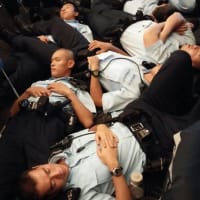
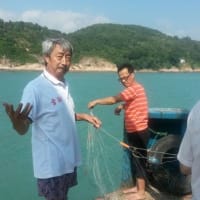
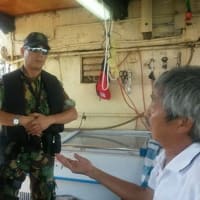
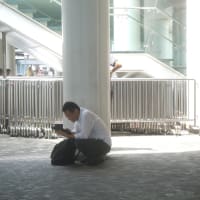
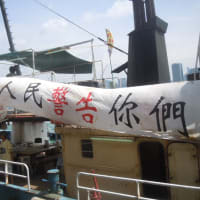
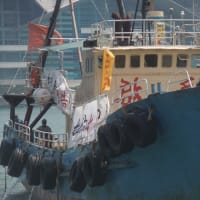
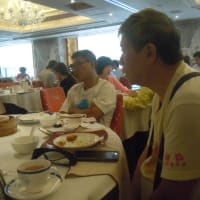
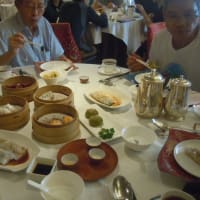
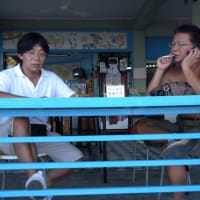
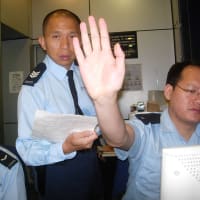
(New York Times 2002.02.28)
By ELAINE SCIOLINO
WASHINGTON, Feb. 27 — Henry A. Kissinger used his historic meeting with Prime Minister Zhou Enlai of China in 1971 to lay out in detail a radical shift in American policy toward Taiwan in exchange for China's help in ending the war in Vietnam, previously classified documents show.
The account of the meeting in the newly released documents contradicts the one that Mr. Kissinger published in his memoirs.
The documents also indicate that the Nixon administration was determined to withdraw from Vietnam — even unilaterally, and even if it led to the overthrow of the government of South Vietnam.
The documents, released today by the National Security Archive, an independent research group, include the transcript of the meeting on July 9, 1971, in which Mr. Kissinger, then the national security adviser, pledged that the United States would not support independence for Taiwan.
The two documents were among 41 recently declassified documents released by the private, nonprofit organization relating to communications between the United States and China that led to Mr. Nixon's visit to China 30 years ago this month.
In the first volume of Mr. Kissinger's memoirs, "The White House Years," published in 1979, he gave the impression that the purpose of the crucial meeting was not to allay tension between the two countries on subjects like Taiwan, which China considers a renegade province. Rather, he wrote, it was "to discuss fundamentals."
He added, "Precisely because there was little practical business to be done, the element of confidence had to emerge from conceptual discussions." Taiwan, he said, "was only mentioned briefly" during the crucial meeting.
The encounter was the first at a high level between the United States and China in almost 20 years and established a relationship of trust that paved the way for President Nixon's historic trip to China in 1972 and the eventual normalization of relations between the two countries.
"The document proves that what Kissinger writes in his memoirs about Taiwan being barely discussed is breathtakingly not true," said James Mann, senior writer in residence at the Center for Strategic and International Studies, and author of "About Face: A History of America's Curious Relationship With China From Nixon to Clinton."
"In the history of U.S.-China relations, it always flew in the face of logic that Taiwan was not discussed."
Mr. Kissinger, reached by phone in London, acknowledged that his memoirs could have been interpreted as misleading. "The way I expressed it was very unfortunate and I regret it," he said. "But we were still recognizing the Taiwan government. We had to get some statements of principle within which we could get into other issues. That was the intention."
The first third of the meeting was consumed by Taiwan, the documents show.
Mr. Zhou clearly stated that in order for relations to be established between the United States and China, the United States must recognize that China "is the sole legitimate government in China" and that Taiwan is "an inalienable part of Chinese territory that must be restored to the motherland."
In another document released today, the transcript of a conversation on April 27, 1971, between Mr. Kissinger and Mr. Nixon, Mr. Kissinger made clear that neither George Bush, then the chief American envoy at the United Nations, nor Governor Nelson A. Rockefeller of New York would be an ideal choice to travel secretly to China to meet Mr. Zhou.
When Mr. Nixon raised the possibility of sending Mr. Rockefeller, Mr. Kissinger said of his former patron, "He wouldn't be disciplined enough, although he is a possibility."
Mr. Nixon agreed, describing Mr. Rockefeller as erratic.
To that, Secretary Kissinger replied, "I think for one operation I could keep him under control. To them a Rockefeller is a tremendous thing."
When Mr. Nixon suggested Mr. Bush, the secretary said, "Absolutely not, he is too soft and not sophisticated enough." At another point, he said that Mr. Bush "would be too weak."
Mr. Nixon replied, "I thought so too, but I was trying to think of somebody with a title."
Ultimately, Mr. Nixon chose Mr. Kissinger for the task.
The exchange is revelatory on a number of levels. Mr. Nixon seemed to be going out of his way to propose almost anyone except Mr. Kissinger as his secret messenger with the Chinese, even though it seemed obvious at the time that as Mr. Nixon's most trusted and subtle foreign policy adviser, Mr. Kissinger was the logical choice.
For his part, Mr. Kissinger revealed extraordinary optimism that opening up the channel with China could bring the war in Vietnam to an end within months. "Mr. President, I have not said this before, but I think if we get this thing working, we will end Vietnam this year," Mr. Kissinger said.
Mr. Kissinger's meeting with Mr. Zhou in July also makes clear the secretary's eagerness to bring the Vietnam War to an end and to enlist China's help in making it happen. With or without negotiations with North Vietnam, he said, "we will eventually withdraw — unilaterally."
Asked about the document, Stanley Karnow, the Vietnam historian, said: "There is no question that ever since the primaries of March 1968 the policy was peace with honor. When Kissinger was in China he said, `Our plan is to get out.' Unilaterally is the key thing. This is new to me."
Mr. Kissinger also told Mr. Zhou that the position of the United States was to work out a military settlement, but not a specific political outcome.
"Our position is not to maintain any particular government in South Vietnam," he said, adding that if the government of South Vietnam "is as unpopular as you think, then the quicker our forces are withdrawn the quicker it will be overthrown. And if it is overthrown after we withdraw, we will not intervene."
In one of two phone conversations today, Mr. Kissinger insisted that his words did not mean that the Nixon administration intended to abandon the South Vietnamese government.
"We were trying to get the Chinese to lean on the Vietnamese and we were conveying to them what our position was all along, that if this were to develop into a political contest we would not prop up a government," he said. "We had hung in there for three years through extraordinary differences. Why would we abandon South Vietnam?"